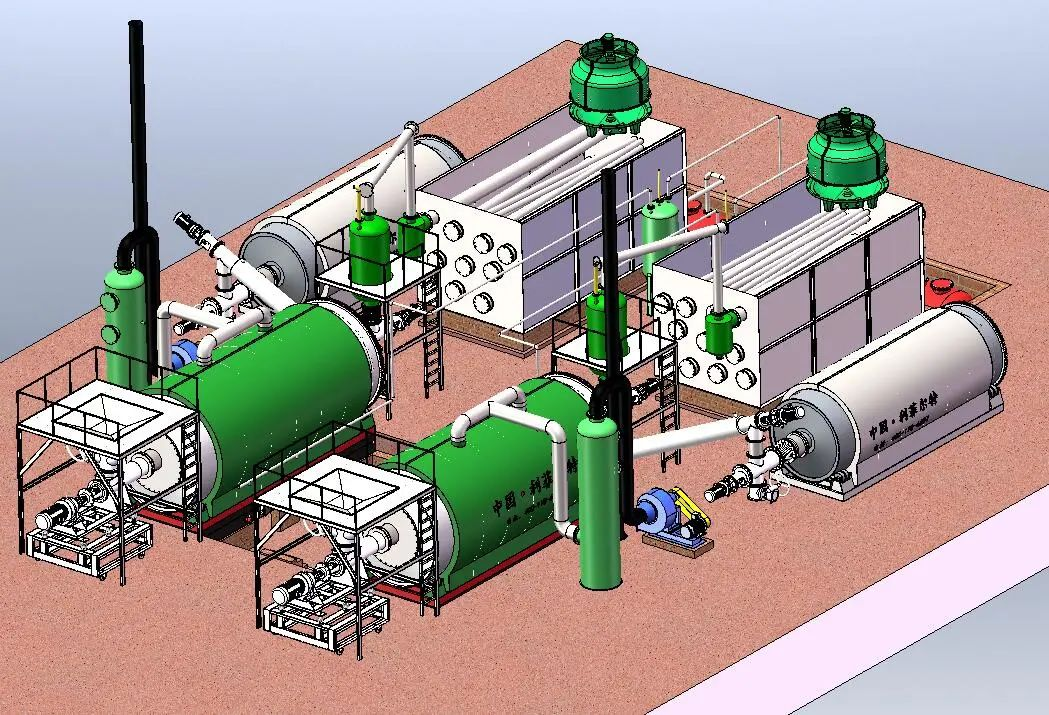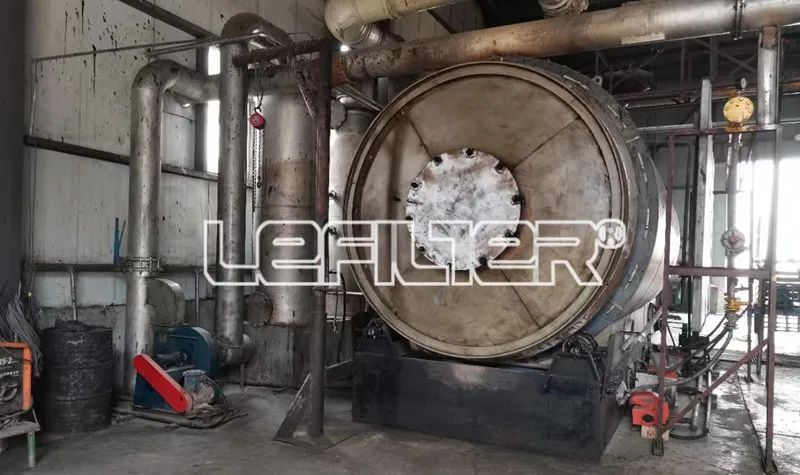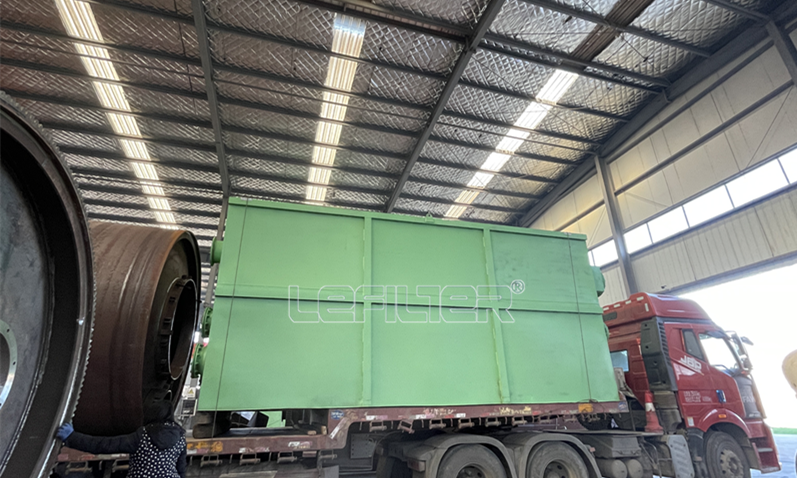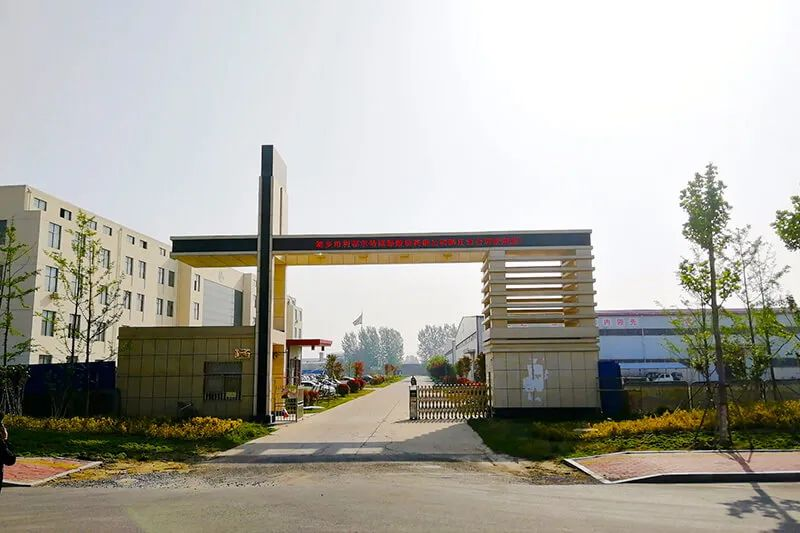The harmful effects of waste plastics on people's lives are becoming more and more serious. It has become an urgent matter to find an effective way to solve the problem of waste plastics. Converting waste plastics into renewable energy through pyrolysis is a method of killing two birds with one stone, which not only solves the problem of waste plastics pollution, but also alleviates the energy pressure.
The cracking reaction process is complex, and there are many influencing factors. Through Lefilter's research, several main factors are summarized, such as the composition of plastics, pressure, reaction temperature, reaction time, reactor type .

01
Composition of plastics
The cracking reaction process and cracking products of different types of plastics are also different. Various types of plastics in waste plastics are mixed together, and various types of plastics will also affect each other, leading to changes in the type and quantity of products. For example, if there are both PP and PE and PS in the mixed plastics, PS will generate catalytic free radicals to accelerate the reaction rate of PP and PE during the cracking process.
Some studies show that when the ratio of various plastics is mixed with 45% PE, 20% PP, 20% PS and 15% PET, the final yield of oil is 48.4%, but if these four plastics are split separately, the yield of oil will be greater than 50%, which proves that different plastics will affect each other in the process of cracking.
In addition, due to the different optimal cracking temperatures of different plastics, in order to ensure complete cracking of all plastics, it should be ensured that the temperature meets the requirements for cracking temperature of all kinds of plastics in the mixture. This will make some easily cracked plastics begin to crack during the heating process of the reactor. When other plastics begin to crack, this part of plastics has begun to enter secondary cracking, resulting in product changes. For example, the cracking temperature of PS is between 320 ℃ and 360 ℃, that of PP is between 360 ℃ and 400 ℃, and that of PE is between 400 ℃ and 500 ℃. Therefore, multi-stage cracking can be adopted during the reaction, or plastics with the cracking temperature close to each other can be put together as far as possible to achieve the best cracking effect.
02
Pressure in cracking furnace
PE is sensitive to the change of pressure in the reaction process, which will lead to coking under high pressure. Although the total amount of oil products has not changed significantly, the proportion of diesel oil has decreased significantly. Some experiments show that in the process of PE cracking, the pressure will gradually increase from 0.1MPa to 2MPa, and the composition of the oil will also change, from C5~C32 to C5~C16. It can be seen that in order to improve the yield of diesel oil, the pressure inside the reactor should be reduced as much as possible. However, it cannot be reduced to negative pressure, otherwise the generated gas cannot be discharged and recovered. Because of the existence of pressure difference, the cracking gas will be discharged quickly, which can improve the reaction rate, avoid the occurrence of secondary cracking, and ensure the quality of gas products. Although reducing the pressure to a certain extent can improve the reaction rate and increase the oil yield, due to the continuous high temperature in the reactor, the equipment requirements for reducing the internal pressure are high, and the cost will also increase, so the cracking equipment at this stage is basically atmospheric pressure.
03
Pyrolysis temperature
Temperature is an important influencing factor of cracking reaction. The cracking products of the same plastic at different reaction temperatures are different. The cracking reaction can be controlled to produce the required products by controlling the temperature. The cracking products of different plastics at different temperatures are shown in the following table:
Plastic type | Reaction temperature/°C | Product |
PP | 120-140 | Oxidized paraffin |
350-500 | High octane fuel | |
PE | 320-380 | Diesel, gasoline, etc |
400-650 | Isobutene | |
PVC | 200 | Dichloroethane |
350 | Aromatic compounds | |
400-500 | Gasoline kerosene | |
PS | 400-450 | Styrene |
When cracking polyethylene, the cracking temperature increases, and the total amount of oil products after cracking remains unchanged, but the proportion of gasoline increases and the proportion of diesel decreases. The cetane number of diesel oil in polyethylene cracking products is high, and the octane number of gasoline is low. Therefore, the content of diesel oil in oil products should be increased as much as possible. The temperature should not be too high. The optimum cracking temperature is about 475 ℃. When cracking polypropylene, the cracking temperature increases and the amount of gas products, including methane, ethane, ethylene, propylene, etc., decreases. When polystyrene is cracked, styrene is the main component in the oil products. With the increase of temperature, the yields of toluene and ethylbenzene also increase. If the pyrolysis temperature is low during the pyrolysis of polystyrene, the reaction duration will increase in order to fully decompose the polystyrene, which will cause carbon deposition on the inner wall of the pyrolysis furnace. With the increase of cracking temperature, the total amount of oil products will not change, but the phenomenon of carbon deposition will be alleviated. When the temperature continues to increase, secondary reaction and excessive cracking will occur with the increase of gas products, and the energy consumption will also increase accordingly.
The heating rate also affects the process and result of the cracking reaction. When the temperature is less than 350 ℃, a large amount of solid carbon black will be generated during the pyrolysis process by slowly increasing the temperature. With the increase of heating rate, the amount of solid carbon black decreased and the gas products increased. When the temperature is higher than 650 ℃, and the heating rate is increased, the output of carbon black and gas products is the smallest, and the output of oil products is the largest. However, due to the high temperature, some oil products are rapidly decomposed into gas products.
04
Pyrolysis time
In the process of plastic cracking, properly increasing the reaction time can make the plastic react completely in the reactor, cracking more thoroughly, which not only increases the total amount of gas and oil products, but also reduces the coking rate. However, if the products are not discharged and collected in time, the generated products will undergo secondary reaction in the reactor, and the products of large molecules will continue to be decomposed into products of small molecules, resulting in a decline in the proportion of oil products, because a part of oil will be decomposed into gas. Therefore, in order to increase the yield of oil products, first of all, it is necessary to properly extend the reaction time to make the plastic completely cracked, and at the same time, it is also necessary to pay attention to the timely removal of slag and the collection of products to avoid the increase of gas products due to the long reaction time.
05
Type of cracking equipment


There are many types of cracking reactors. Different types of reactors have different heat transfer efficiency, heat distribution and flow state of molten materials in the reactor, which will affect the time and result of cracking reaction. When selecting the cracking equipment, the cracking device with high heat transfer efficiency, smooth material delivery and suitable for most plastics should be selected. At the same time, attention should be paid to whether the cracking products can be recovered in time during the cracking process.
Company Profile

Lefilter has always been committed to creating "one-stop, professional" services, and hopes that customers can achieve the most satisfactory results in the shortest time with the least money and energy. We cherish every cooperation with customers very much. We know that only by constantly absorbing and digesting can better products and services be fed back to the market.